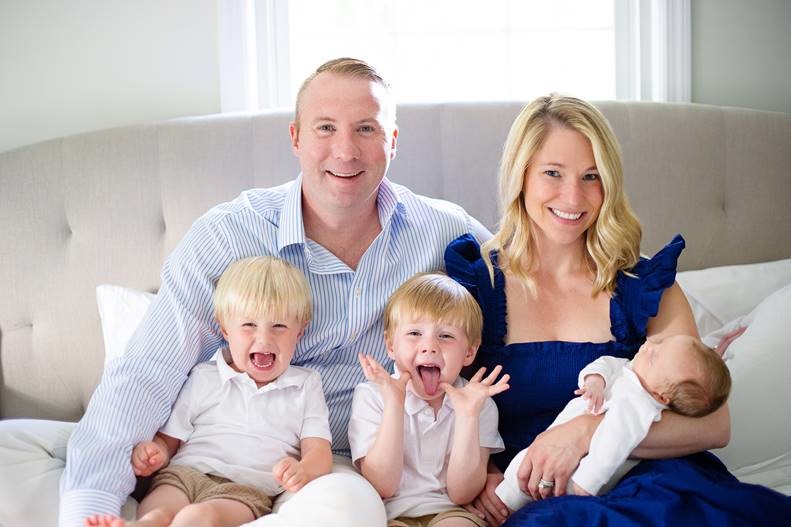-
Services
Featured Specialties
-
Locations
Location Type
-
Patients & Visitors
Published December 08, 2023

Courtney Yeager, a registered radiologist assistant, breast imaging navigator and lactation educator from Fairfield, CT, was ready for a third baby. Her first two pregnancies were mostly uncomplicated, and Courtney was able to have the un-medicated, intervention-free births she desired. However – a small mixing of blood between baby and mom in Courtney’s prior pregnancy caused her immune system to develop antibodies that potentially threaten the health of her third baby and reinforce her ideals of an empowered birth.
“My husband and I had incompatible blood types, so I knew there could be an issue,” said Courtney, who rattles off blood science fluently. “My immune system developed antibodies against my baby’s blood in my first pregnancy and I took a medication made from donor plasma to prevent a larger immune response. It worked well, but not perfectly.”
Courtney was experiencing alloimmunization. This is when the maternal immune system creates antibodies that can cross the placenta and attack fetal red blood cells. This sustained attack can cause severe anemia also called hemolytic disease of the fetus.
Hemolytic disease of the fetus and newborn, occurs in 3 to 80 out of every 100,000 pregnancies annually and can be fatal if not treated.
“The placenta is an incredible organ that typically prevents mom and baby’s blood from mixing,” said Katherine Kohari MD, associate director, Yale New Haven Children’s Hospital’s Fetal Care Center and assistant professor at Yale School of Medicine. “However, there are some instances where a little blood is mixed, for example during delivery, and that small exposure for some people is enough to mount an immune response that causes issues in subsequent pregnancies.”
Because of her risk factors, Courtney was getting biweekly high-risk ultrasounds at the Fetal Care Center. These ultrasounds looked inside the blood vessels in her baby’s brain to measure his risk of anemia.
“I was in the clinic a lot, so it was nice that all the technologists performing the exams were knowledgeable and started to feel like family,” said Courtney, who also connected with moms who have gone through similar experiences.
At her 23-week ultra-sound it was determined that Courtney’s baby was becoming anemic, and she was advised to go straight to Yale New Haven Hospital from the ultrasound. “Even though I was prepared for this to happen it was still a shock,” said Courtney. “I was quickly walked through what would happen next which was an intrauterine fetal blood transfusion.”
Dr. Kohari and the team did another ultrasound and worked with the blood bank team to confirm that a blood transfusion was the best course of action. Injecting donor blood into the baby's umbilical cord helps correct the baby’s anemia and prevent complications. The benefits of the procedure, which often involves an epidural and recovery period, last about two weeks. Courtney went through this procedure six times.
“Everybody that could be involved in my care talked to me about the potential outcomes because at that point you have to prepare for everything,” said Courtney who had sidelined her emotions to ensure she was asking the pertinent questions to feel comfortable moving forward.
Courtney’s first pregnancies were managed by the Center for Women’s Health and Midwifery practice because she values an experience that is as intervention free as possible. Despite being a high-risk pregnancy, she was able to keep that team of midwives with her through this third pregnancy.
“I so badly wanted an intervention-free experience for this third birth,” said Courtney. “Between the midwife team and accommodations from Maternal Fetal Medicine, they worked with me to have an amazing birth despite all my risk factors.”
Courtney was induced out of medical necessity and had no epidural by choice. She incorporated music, affirmations and elements from her hypnobirthing classes into her labor. Baby Beau was born in a calm atmosphere filled with love and joy. He required three additional transfusions after birth.
“The MFM team works in concert with our outstanding midwifery and general OBGYN practices,” said Dr. Kohari. “What is so special about this arrangement is that we provide interventions when necessary but also de-medicalize things that don’t need to be medicalized so patients can craft an experience that meets their needs.” Dr. Kohari makes it her personal goal to donate blood multiple times a year in appreciation for the amount of blood often used for these procedures and in the care of other complex obstetric patients.
At five months old Beau got a clean bill of health and Courtney could finally process all they had been through together. “Sometimes, I still can't believe he's here and he's 17 months now!” said Courtney.
Beau is happiest when playing with his older brothers, a bond that strengthens daily. The only lasting indications of the nine blood transfusions he experienced is his bright future ahead.